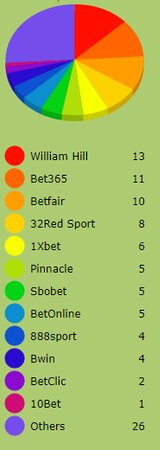Betting consensus numbers, or bet splits, are some of the most popular and highly-circulated pieces of betting content on the internet. However, there are limited benefits in using this kind of information when deciding which outcome to bet on for an event. Read on to find out why the kind of betting data you use is important.

Betting consensus numbers are certainly interesting and can often give us insight into what a sample of bettors think or what influences their decisions. Unfortunately, if you’re using it to try and identify a value bet, the data isn’t as useful as you might think and can often lead bettors to make poor decisions. Here is a look at the downside and what bettors should focus their energy on instead.
What is the betting consensus?
The betting consensus is a breakdown of all the bets on an event expressed in a percentage form to show which team has more action. For example, if 100 bettors place a bet on a match, and 60 bets are on Team A and 40 bets are on Team B, the consensus report will read Team A 60% - Team B 40%.
Bettors will often look for large splits in the consensus and fade the higher percentage believing that the majority of bettors will be wrong in their prediction.
Why is it popular?
As the reach of sports betting increases into mainstream media, betting consensus numbers are becoming more popular than ever. Many bettors believe that the bookmaker never loses, and the appeal of being able to side with bookmakers on a decision instils many with confidence in their bets.
The willingness of an audience to latch on to these percentages has made consensus percentages a staple talking point across all content levels.
What is the downside?
I encourage bettors to avoid acting on the information derived from betting consensus numbers alone at all cost for a few main reasons:
Empty work doesn’t pay
Sports betting is bettor vs. bettor. Whoever has the most information has the biggest advantage. Studying betting consensus numbers is empty work. Even if the consensus numbers are accurate, none of the effort put in to decipher them can be carried over to the next day. Consensus numbers apply only to present events and are not predictive in any way.
Misaligned intent
Bettors like consensus numbers because they believe it aligns their need to win with the bookmaker. The problem is that no consensus percentage will express the true need of a bookmaker and seldom will it reflect the financial decision that matters to them.
In my half-decade working as a bookmaker, rarely did pre-game straight bets account for more than 30% of the full handle on an event. Recent gaming surveys for 2018 show that some bookmakers earn up to 80% of their revenue off in-play bets.
An unknown source
“Fade the public” is unfortunately a popular term in sports betting. Many bettors will blindly oppose any large consensus percentage and believe their contrarian approach is due to pay off long term.
The big problem here is that the betting population which makes up the percentage is completely unknown. Betting percentages on the same event differ from bookmaker to bookmaker as do the clientele betting. Bettors opposing consensus percentages are blindly betting against an unknown popular and doing so without any context.
Limited opportunity
If bettors are only looking at events in which they estimate the house has a large liability, they limit their opportunities. Sports betting markets are extremely competitive and finding an edge is critical for success. If the potential to find an edge is limited to a small number of the total events per day, the bettor is at a huge disadvantage against the rest of the market.
What can bettors look at instead?
Every minute spent studying teams and odds should be done in a way that knowledge can compound over time. Rather than trying to find a value bet just from consensus percentages, bettors should focus their energy into understanding how bettors in the market interact with each team.
Studying margins, and seeing which teams move in price at which bookmaker, and how the movement affects the other bookmakers in the market, can provide valuable insight that can be used in the future.
Bettors should always be asking questions like;
- Which teams move early?
- Which teams move late?
- Is this a set-up, or a true position?
- Is this a low margin move, or recreational move?
Once answers to these questions become automatic, time wasted on consensus percentages will become clear.
MORE: TOP 100 Online Bookmakers >>>
MORE: TOP 20 Cryptocurrency Sportsbooks >>>
MORE: Best E-Sports Betting Sites >>>
Source: pinnacle.com

